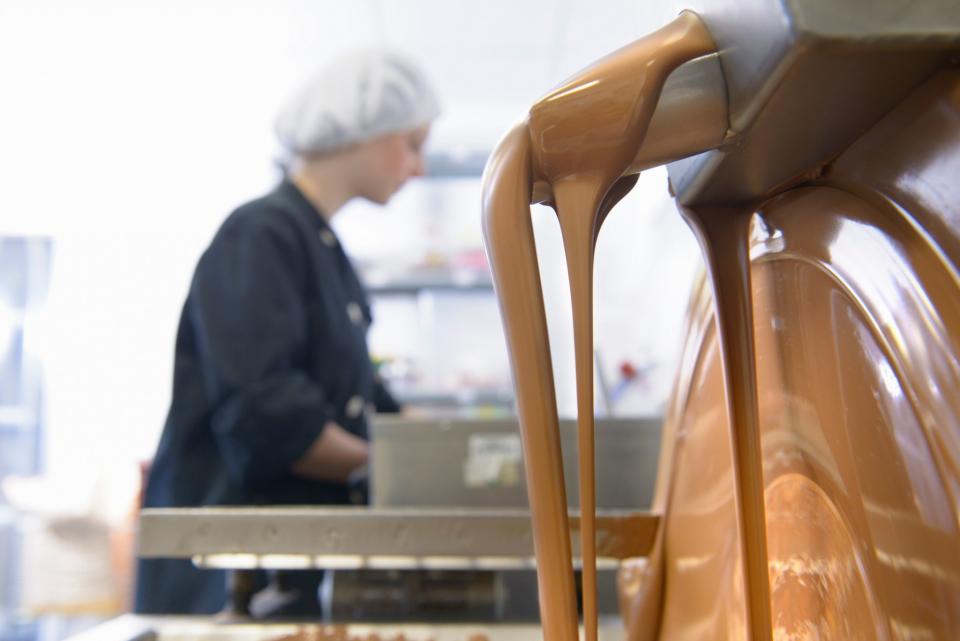Why you should be buying more chocolate this Easter

‘Everywhere in the world there are tensions – economic, political, religious. So we need chocolate’ -Alain Ducasse
This column is undoubtedly not the place to be discussing whether chocolate is a superfood or not but consumption levels in most households over the Easter period are likely to be fairly solid.
During a week when the combination of business surveys, patchy wage growth numbers and poorly received interim results from Tesco highlighted the current challenge of unlocking customer wallets, the annual chocolate fest should be a win-win for shops, consumers and investors alike.
Except it is not. Oil and precious metal prices may be up over the last year but cocoa is down 33% – the standout worst performance of all the global commodities I monitor. And don’t think this is some kind of short-term tough comparison – the current price of cocoa was last seen back in 2007 just before the global financial crisis.
READ MORE: WD-40 tells us everything we need to know about the financial world today… yes, really
READ MORE: The winners and losers in the world’s financial markets so far in 2017
READ MORE: Should you be fearful of a stock market crash?
This latter observation makes a good point. Most global bond and equity markets have performed marvellously over the last eight years helped by global Central Bank stimulus and perhaps the natural order of things after a big crash. Anyone looking forward over the next eight or 10 years, however, would be wise to spend a few minutes musing on how an investment returns feast is often followed by a period of investment returns famine where you have to be a bit cleverer – or different – with your investment selections. Look at the panicky headlines the war of words around North Korea has produced this week, while the volatility focused VIX index – dubbed the ‘fear index’ by many commentators – pushed up to a new 2017 high.
And that brings us to commodities. Most investors know that a little bit of gold can improve the characteristics of a portfolio invested only in equities, bonds and cash, and the progress of the shiny metal to levels last seen a day after the election of Donald Trump does not surprise me. While there is plenty of gold-coloured wrapping covering the Easter eggs you will all be consuming over the long weekend, let’s think about one of the core raw materials underneath the flashy exterior: cocoa.
So, why are cocoa prices currently so poor? Well if you ask the experts at the International Cocoa Organization (ICCO), inspired by the high prices of a few years ago, higher production – as well as benign weather conditions – in key growing countries like Ivory Coast and Ghana have boosted supply by a surprising amount. You can guess pretty quickly the lack of incentive current low prices are having to even maintain current production. The weather, of course, is anyone’s guess, but the narrow slivers of the world that have the right mixture of heat and rain for the notoriously fickle cocoa beans to prosper indicate the challenge being faced.
All of this is happening as chocolate consumption continues to go up. Admittedly, chocolate consumption is not as bullet-proof as a few years ago – fears over sugar consumption levels have had an impact – but more premium, higher cocoa content tastes have increased and the emerging markets still offer good consumption scope over time. China, for example, is running at around a tenth of UK consumption levels and a fifteenth of Swiss ones.
In short, none of this is a disaster for the humble cocoa price but might prove a hassle for some of the larger chocolate heavy food manufacturing names out there including Nestle, Mondelez (who now own Cadbury), Hershey (who Mondelez recently tried to take over) and Lindt. Still, they are compensated by owning strong brands in an area where there are likely to be growth opportunities even in an era of generalised investment returns famine.
Cocoa price-linked investments are almost as exotic as the history, intrigue and stories around the product itself, but having something at least chocolate facing in your portfolio makes some sense to me.
Now you even have the excuse to call some gratuitous chocolate consumption necessary investment research.
Chris Bailey has over 20 years of investment industry experience at long-only and long-short institutions as a global multi-asset fund manager, strategist/macro thinker and, in the earlier part of his career, as a securities and fund analyst.
In 2013 he founded Financial Orbit focusing on daily macroeconomic comment and securities analysis. In December 2016 his Twitter account (@financial_orbit) was named as one of the ’50 accounts investors should follow in 2017’.
The content on this page does not constitute financial advice and is provided for general information purposes only. Nothing on this page should be regarded as an offer to conduct investment business or to buy/sell any investments.

 Yahoo Finance
Yahoo Finance 
